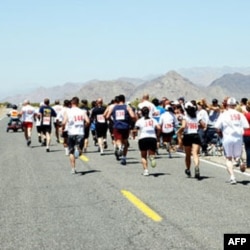JUNE SIMMS: Welcome to AMERICAN MOSAIC in VOA Special English.
(MUSIC)
I’m June Simms. This week on our program, we hear new music from Lionel Richie ...
And, talk to a man who organizes a law enforcement foot race through the Mojave Desert in the American southwest …
But, first, we go to a school in Maryland for a lesson in giving …
(MUSIC)
Food on the 15th
JUNE SIMMS: School-centered education is important, but children also can learn a lot from real-life experiences. Just ask some young people who collect food for needy adults every month. Barbara Klein has more about a nonprofit program called Food on the 15th.
BARBARA KLEIN: On the fifteenth of each month, volunteers are busy working inside a classroom at Pointers Run Elementary School in Maryland.
Students collect food that has been donated by students, parents and teachers. First, the children look at dates marked on the donated food to make sure it is safe. Next, they organize it into groups. Then, the food is placed in bags for transport to older, needy adults in the community.
Julie Rosenthal started Food on the 15th six years ago.
JULIE ROSENTHAL: “I wanted to teach my daughter about philanthropy, about helping others who were less fortunate in our community. And I wanted to teach other kids in the community, too.”
Six years ago, Julie Rosenthal’s daughter, Jenny Mandle, was in fifth grade. Now, she is fifteen and still involved. She says she thought differently back then.
JENNY MANDLE: “I honestly thought that food just came right out of the pantry, money grew on trees. I had no idea that there were people in Howard County, like where I live, that didn't have food every month, that had trouble making ends meet.”
The children and parent volunteers take the food to the needy around the fifteenth of the month. That is when money from monthly Social Security payments begins to run out. Older people often have to make difficult decisions between buying food and using the money for other needs.
Linda Testerman is among those receiving the donated food.
LINDA TESTERMAN: “I'm on a fixed income and the food, with the prices at the grocery store, it has helped me out tremendously.”
Ms. Testerman says she enjoys seeing the children. And the students get the sense of satisfaction that comes with giving. Student Campbell Snoddy says she enjoys her Food on the 15th experience.
CAMPBELL SNODDY: “It was really fun, it was great to make the senior citizens happy. It was really cool.”
Julie Rosenthal says that is why she has children do more than fill bags with food.
JULIE ROSENTHAL: “We want the children to have firsthand experience delivering the food to the people so that they can get that feeling of really making a difference in somebody’s life, a positive difference.”
The program started with one school providing thirty bags of food. It has grown each year, and now involves ten schools and several churches. To date, Food on the 15th has collected and delivered more than twelve thousand bags.
Julie Rosenthal explains the success of the program.
JULIE ROSENTHAL: “It is the power of one. People don’t realize the power of one is huge; one more bag of food, one more container of macaroni and cheese, one more person helping. One person does make a difference."
Challenge Cup / Baker to Vegas Relay
JUNE SIMMS: Footraces are popular in America. Some are held to decide the fastest athletes. Others raise money for social causes, like cancer research. But one race in California is held in the name of good relations among members of a profession that depends on cooperation: law enforcement.
Los Angeles, California, police officers Chuck Foote and Larry Moore created the Challenge Cup/Baker to Vegas Relay in nineteen eighty-five. The twenty-eighth annual running of the two-day event will start April twenty-first. Hundreds of law enforcement teams take part. Most are from California and the American southwest, including New Mexico and Texas. But, Chuck Foote says, some of the runners come from much farther away.
CHUCK FOOTE: “We have several federal teams who probably do draw personnel from throughout the United States. We have four teams from Canada, we have a South Wales team from the UK and we have Hamburg, Germany. So we do have some international teams.”The two-hundred-nine-kilometer race path goes along small roads through the Mojave Desert. Chuck Foote says it gets very hot. He says most of the time the temperature will be over thirty-two degrees Celsius and as high as thirty-nine. However, runners only have to cover about ten kilometers each. There are twenty runners on each team and twenty exchange stations along the path. A new runner starts at each station.
Chuck Foote says thousands of volunteers help organize and carry out the race. Each team has about twenty members who assist the racers. Then, there are thousands of other volunteers who help with operations. They set up the exchange stations, making sure there are bathrooms, water, lighting and other supplies. Medical workers also set up at each station. And there are ambulances and helicopters on standby to help deal with injuries and sickness.
Chuck Foote now serves as director of the California Police Athletic Association. He is also the coordinator of the Challenge Cup/Baker to Vegas Relay. He says the race takes almost a full year to organize. But, he does not stop there. He also runs in the race himself every year.
Chuck Foote says he thinks the Challenge Cup has been successful in its goal of unity.
CHUCK FOOTE: “It’s a great opportunity for that kind of thing to happen. It gives law enforcement a chance to talk to other law enforcement from throughout the western U.S., and even outside the U.S., as to how things go. You know, police work being pretty much the same no matter where you go. They get a chance to meet others.”
This year’s race ends on April twenty-second inside the conference room at the Las Vegas Hotel and Casino.
(MUSIC)
Lionel Richie / "Tuskegee"
JUNE SIMMS: The singer and songwriter Lionel Richie has a new and unusual album. He worked with American country music stars to reproduce some of the hit songs from his past. Bob Doughty has music from the new album, “Tuskegee.”
BOB DOUGHTY: Lionel Richie became famous in the nineteen seventies as lead singer of The Commodores. The group had huge success with dance songs like “Brick House” and love songs like “Easy.”
Lionel Richie left the Commodores in nineteen eighty-two and continued to be very successful on his own. In fact, he sold millions of record albums. And other performers recorded his songs. Over the years, he won many awards for his work, including four Grammys and an Academy Award.
“Tuskegee” includes some of that winning music. But what makes the album different is that the singer performs his songs with country music artists, like Shania Twain and Jason Aldean.Lionel Richie also performs with country singers that have reached career heights equal to his own. For example, he performs with Willie Nelson on the nineteen seventy-seven Commodores song, “Easy.”
(MUSIC)
“Tuskegee” is a city in the state of Alabama. It is also home to the famed Tuskegee Institute, now Tuskegee University. Lionel Richie grew up in the city and studied economics at the institute. The singer-songwriter said country music was an early influence in his life. He said making “Tuskegee” seemed natural.
Here, he sings with Jennifer Nettles of Sugarland on “Hello.”
(MUSIC)
We leave you with Darius Rucker and Lionel Richie performing, “Stuck on You,” from the album “Tuskegee.”
(MUSIC)
JUNE SIMMS: I’m June Simms. Our program was written and produced by Caty Weaver.
Join us again next week for music and more on AMERICAN MOSAIC in VOA Special English.





